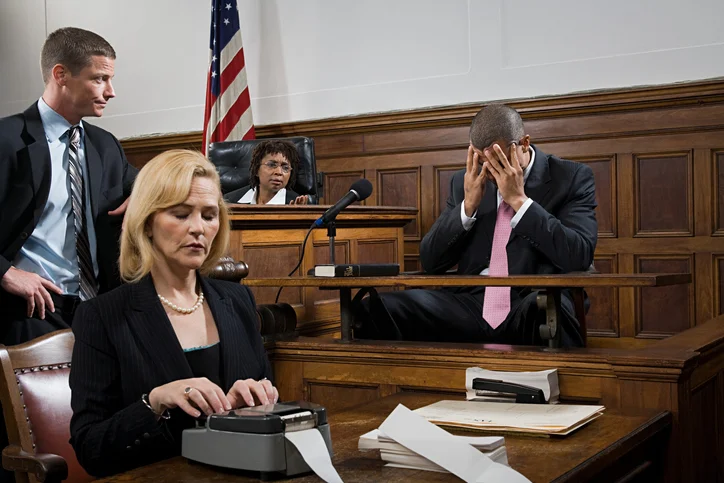The Benefits of Using Qualified Court Reporting Professionals
Comprehending the Relevance of Court Reporting in Legal Services and Procedures
Court coverage plays a pivotal duty in the lawful landscape, offering as the foundation of precise paperwork in various legal proceedings. By providing verbatim records, court press reporters make sure that every statement and disagreement is carefully captured, thereby safeguarding the honesty of the judicial procedure.
Role of Court Reporters

In enhancement to transcription, stenotype reporter are often tasked with handling and maintaining the circulation of procedures. They need to excel in legal terms and have a detailed understanding of court protocols to ensure that the document shows the context and nuances of the discussion. Their job might likewise extend past standard courts, encompassing management hearings, mediations, and other lawful setups where documentation is important.
Moreover, stenotype reporter may provide real-time coverage, allowing immediate accessibility to transcripts throughout proceedings, which can be critical for the reliable administration of justice. By making sure that an exact record is maintained, court press reporters support the honesty of the legal procedure, helping with allures and serving as a crucial resource for lawyers in their search of justice.
Significance of Precision

The function of precision prolongs past plain transcription; it incorporates the ability to capture the nuances of speech, including tone, emphasis, and non-verbal hints, which can be vital in recognizing the context of declarations made. A precise record ensures that all parties involved-- judges, juries, and lawyers-- have access to the same information, promoting fairness and transparency in the judicial process.
Additionally, precise transcripts are important for the appellate process, where higher courts rely upon them to evaluate lower court choices. Errors can threaten the result of a charm, potentially affecting an event's freedoms and rights. Hence, the dedication to accuracy in court reporting is not simply a specialist responsibility but a cornerstone of justice that promotes the regulation of regulation.
Types of Lawful Procedures
Covering a wide selection of legal contexts, stenotype reporter are important in numerous kinds of legal process, each requiring distinctive techniques and skills. Amongst the most usual types are civil lawsuits, criminal trials, and administrative hearings. In civil lawsuits, stenotype reporter record depositions, testaments, and movements, guaranteeing that every information is documented precisely for potential appeals or settlements.
In criminal trials, the function of stenotype reporter ends up being a lot more crucial, as they transcribe all elements of the procedures, consisting of jury selections, witness statements, and sentencing stages - Court Reporting. The accuracy and immediacy of these documents are paramount, offered the prospective repercussions for offenders and the integrity of the judicial system
Administrative hearings, often conducted by governmental firms, also rely upon court reporters to preserve official documents of proceedings. These hearings can entail disagreements pertaining to regulative conformity, work problems, or expert licensing, necessitating specific paperwork.
Additionally, specialized process such as arbitration and arbitration need court reporters to record the nuances of agreements and negotiations. Each kind of legal action presents unique difficulties, underscoring the relevance of knowledgeable stenotype reporter in promoting the stability of the legal procedure.
Innovation in Court Coverage
Improvements in modern technology have actually reinvented the area of court reporting, improving both efficiency and precision in the transcription process. Typical approaches of hand-operated note-taking have actually been supplemented and, in many cases, changed by advanced digital tools that streamline operations and boost precision (Court Reporting). Court reporters now utilize innovative steno equipments outfitted with real-time transcription capacities, enabling instant access to a verbatim account of process
Additionally, the combination of speech recognition software has actually additionally transformed the try this website coverage landscape. This innovation enables the automated transcription of talked words, considerably reducing the moment required for producing main records. In addition, cloud-based platforms facilitate very easy storage and access of transcripts, making sure that lawyers can access necessary documents from anywhere, any time.
Video clip conferencing devices have additionally arised as vital parts in remote depositions and hearings, helping stenotype reporter catch procedures in real-time, no matter of location. The combination of these technological technologies not just improves the precision of legal documents but additionally supports a much more adaptable and efficient click reference lawful procedure. As the field proceeds to advance, embracing these improvements will be vital in meeting the growing needs of the legal market.
Moral Factors To Consider in Reporting
The combination of technology in court reporting brings with it a set of honest factors to consider that professionals need to browse thoroughly. As stenotype reporter significantly employ digital tools, problems bordering privacy, stability, and precision pertain to the forefront. Shielding delicate details is paramount; reporters must ensure that any electronic records are securely stored and shared only with authorized individuals.
In addition, the precision of transcriptions is important. Making use of software program for real-time coverage does not discharge court press reporters from the obligation of making sure that the end product is accurate. Ethical obligations dictate that any errors must be promptly dealt with and connected to pertinent celebrations.

Lastly, compliance with legal criteria and market regulations is crucial. Court press reporters must remain informed regarding evolving moral guidelines to maintain the trust positioned in them by the legal system. By resolving these moral considerations, court press reporters can remain to give indispensable solutions in lawful procedures while keeping public confidence.
Verdict
In conclusion, court coverage plays a vital function in the lawful system by ensuring precise and reliable documentation of judicial procedures. The this post precise work of stenotype reporter upholds the integrity of the lawful procedure and supports the civil liberties of people involved. The assimilation of modern technology improves efficiency while preserving moral requirements. Ultimately, the importance of court coverage can not be overstated, as it offers as a vital foundation for fairness, transparency, and the efficient administration of justice.
Court coverage plays an essential function in the legal landscape, offering as the backbone of accurate documentation in various lawful process.Court press reporters continually play an essential duty in the judicial procedure by producing accurate, verbatim transcripts of lawful process.Additionally, exact records are essential for the appellate process, where higher courts depend on them to evaluate reduced court choices.Covering a large selection of lawful contexts, court reporters are vital in numerous types of lawful process, each needing unique strategies and skills. By dealing with these moral factors to consider, court reporters can continue to supply vital services in lawful procedures while maintaining public self-confidence.